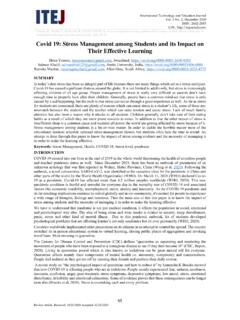Transcription of The Importance of Social Welfare in the Developing World
1 ! Journal of International Social Issues (September 2012) Volume 1 Number 1 Page 11-21 The Importance of Social Welfare in the Developing World Mohit Prodhan University of Information Technology & Sciences Cathleen Jo Faruque Winona State University Numerous non-governmental organizations (NGOs) and international non-governmental organiza-tions (INGOs) have been working on a massive scale in Bangladesh parallel to the existing govern-mental efforts to alleviate poverty. There have been many success stories, however, more is needed and a change in approach and philosophy is thus called for.
2 To increase efficiency of the various Social Welfare programs greater coordination of NGOs by the government is essential. This also calls for well trained workers in the field and Bangladesh has good training programs in Social work pro-vided by different universities. As the history of Social work, as a profession, has historical roots in the Western World , the curricula followed by the different programs in the country are based on western curricula. There is growing realization, however, of the Importance and relevance of in-digenization of Social work in a globalized World and the curricula in different countries need to be modified to suit individual local areas and populations.
3 Additionally an element of internationaliza-tion is also required in order to better train individual workers to work with a myriad of different environments the new World offers. Social Work in Bangladesh Social work is a profession that is integral and interwoven in all societies. How-ever, the extent of the type of Social work in any given country is often under debate. In a densely populated and deeply impoverished country such as Bang-ladesh there is little doubt that the Social Welfare networks should be extensive and well coordinated. Bangladesh is a country that affords a far-reaching net-work of private NGOs, that encompass diverse urban and rural nuances, while there is little done on behalf of the government to coordinate with this private sector of Social Welfare and virtually little is done to offer services to those who live in extreme impoverishment.
4 Much of the diverse types of Social Welfare currently being offered in Bang-ladesh could be greatly enhanced with government assistance in coordinating the efforts of the thousands of NGOs that operate here. In addition to this, the government must take a step forward in creating plausible standards regarding Social work in Bangladesh. These standards must address several key areas: dis-Journal of International Social Issues 12 aster management, poverty reduction, violence, and urbanization. While these are certainly not the only areas that need our attention, they are definitely the most prevalent and encompass a majority of people in Bangladesh.
5 It is also the-se areas that urgently need to be addressed in order to prevent any further natu-ral or man-made catastrophes and to establish a solid foundation on which de-velopment can proceed. Social Work Standards in Bangladesh The Social work profession, both in education and in practice, varies in its defini-tion and mode of operation across the globe and carries different meanings and contexts from country to country. However, the ideology and hence the very heart of Social work remains central to development of services in that it is a pro-fession targeted at interventions for Social support and for developmental, pro-tective, preventative, and therapeutic purposes.
6 In the past decade, there has been a significant increase in the literature concerning the benefits and the costs of internationalizing the Social Welfare curriculum for qualifying or specialist education of Social work professionals, inclusive of the value of international fieldwork placements. Reference has been made in the most recent regulations in United States passed down by the Council on Social Work Education to the need of preparing all students for practice, which is cognizant of international influences and which has a focus on competence with the culturally diverse populations Social workers serve (Carlsen, 2005).
7 Further, a recently established benchmark in this regard was for the professional qualification at the baccalaureate level of Social work in the United Kingdom which indicated a need for knowledge which is informed by international and comparative perspectives (Williams, 2005). However, there has been relatively little systematic study at the international or even cross-national level to date, that would determine how international perspectives would be incorporated and to what extent newly qualified Social workers incor-porate international dimensions in their knowledge and skills of professional practice.
8 Aside from the likely benefits, costs other problems of including interna-tional learning opportunities in qualifying Social Welfare programs has also been identified in current literature (Carlsen, 2005; Wilson, 2005). The accepted knowledge suggests that many Social work programs admit to lacking in knowledge and confidence in the development of curricula that is appropriate for the international arena, or more often, consider that the existing curriculum is already too full of new material. Some time back, Healy (1986), advanced the idea that attitudes toward inclusion of international perspectives in Social work should be mapped on a continuum from Social work schools, where they are now merely tolerant, through sporadic activities and more responsive measures such as by offering courses on international issues or international field place-ments.
9 From the limited studies available and other evidence to date, including the low response to a survey in 2005 carried out by Bareeta-Herman, of the In- ternational Association of the Schools of Social Work, (IASSW), it would seem that tolerance or minor responsiveness is the universal standard in Social work Social Welfare in the Developing World 13 education. The need is a shift from tolerant to commitment where schools should have a well articulated and regular element of international Social work in the curriculum. However, the situation does change if concerns are expressed in relationship to the need for intercultural learning and development of anti-oppressive approaches in the Social work profession, as well as cross-cultural communication skills, cultural competence, and recognition of diversity in local populations.
10 In these areas, Social work curriculum and program content has grown. These subjects have relevance to the development of international Social work perspectives and at the qualifying stages of curriculum development could mean some reorientation of what is taught and assessed rather than the intro-duction of new courses. There has been some literature that has identified the need for inclusion of teaching in relationship to particular skills or approaches, not necessarily in the context of international course development, but which are relevant. For exam-ple, Schneider and Lester (2001) identified advocacy as a core area in which Social work professionals should be proficient and this would fit well in a view of how Social work education and practice could be developed both for regional and international contexts.










